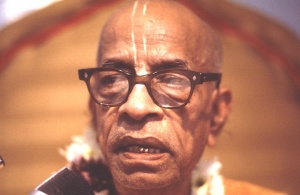SB 5.25.7

A.C. Bhaktivedanta Swami Prabhupada
TEXT 7
- dhyāyamānaḥ surāsuroraga-siddha-gandharva-vidyādhara-muni-gaṇair
- anavarata-mada-mudita-vikṛta-vihvala-locanaḥ
- sulalita-mukharikāmṛtenāpyāyamānaḥ sva-pārṣada-vibudha-yūtha-patīn
- aparimlāna-rāga-nava-tulasikāmoda-madhv-āsavena
- mādyan madhukara-vrāta-madhura-gīta-śriyaṁ vaijayantīṁ
- svāṁ vanamālāṁ nīla-vāsā eka-kuṇḍalo hala-kakudi
- kṛta-subhaga-sundara-bhujo bhagavān mahendro vāraṇendra
- iva kāñcanīṁ kakṣām udāra-līlo bibharti
SYNONYMS
dhyāyamānaḥ — being meditated upon; sura — of demigods; asura — demons; uraga — snakes; siddha — inhabitants of Siddhaloka; gandharva — inhabitants of Gandharvaloka; vidyādhara — Vidyādharas; muni — and of great sages; gaṇaiḥ — by groups; anavarata — constantly; mada-mudita — delighted by intoxication; vikṛta — moving to and fro; vihvala — rolling; locanaḥ — whose eyes; su-lalita — excellently composed; mukharika — of speech; amṛtena — by the nectar; āpyāyamānaḥ — pleasing; sva-pārṣada — His own associates; vibudha-yūtha-patīn — the heads of the different groups of demigods; aparimlāna — never faded; rāga — whose luster; nava — ever fresh; tulasikā — of the tulasī blossoms; āmoda — by the fragrance; madhu-āsavena — and the honey; mādyan — being intoxicated; madhukara-vrāta — of the bees; madhura-gīta — by the sweet singing; śrīyam — which is made more beautiful; vaijayantīm — the garland named vaijayantī; svām — His own; vanamālām — garland; nīla-vāsāḥ — covered with blue garments; eka-kuṇḍalaḥ — wearing only one earring; hala-kakudi — on the handle of a plow; kṛta — placed; subhaga — auspicious; sundara — beautiful; bhujaḥ — hands; bhagavān — the Supreme Personality of Godhead; mahā-indraḥ — the King of heaven; vāraṇa-indraḥ — the elephant; iva — like; kāñcanīm — golden; kakṣām — belt; udāra-līlaḥ — engaged in transcendental pastimes; bibharti — wears.
TRANSLATION
Śukadeva Gosvāmī continued: The demigods, the demons, the Uragas [serpentine demigods], the Siddhas, the Gandharvas, the Vidyādharas and many highly elevated sages constantly offer prayers to the Lord. Because He is intoxicated, the Lord looks bewildered, and His eyes, appearing like flowers in full bloom, move to and fro. He pleases His personal associates, the heads of the demigods, by the sweet vibrations emanating from His mouth. Dressed in bluish garments and wearing a single earring, He holds a plow on His back with His two beautiful and well-constructed hands. Appearing as white as the heavenly King Indra, He wears a golden belt around His waist and a vaijayantī garland of ever-fresh tulasī blossoms around His neck. Bees intoxicated by the honeylike fragrance of the tulasī flowers hum very sweetly around the garland, which thus becomes more and more beautiful. In this way, the Lord enjoys His very magnanimous pastimes.